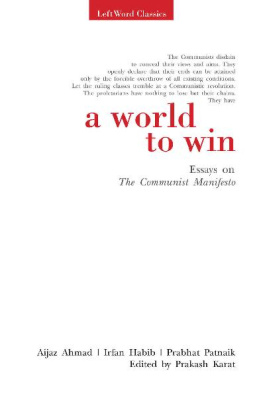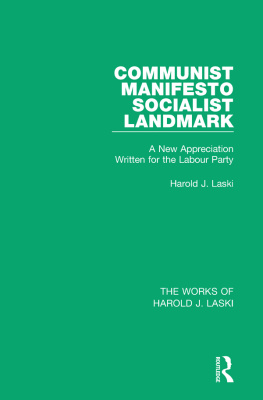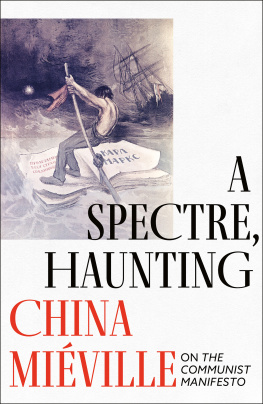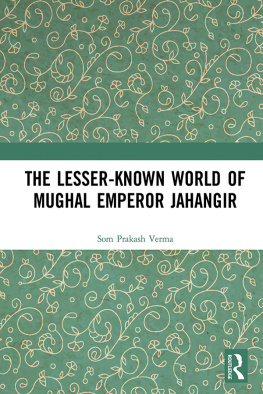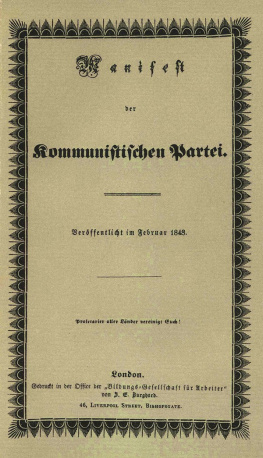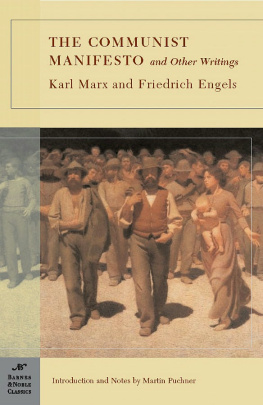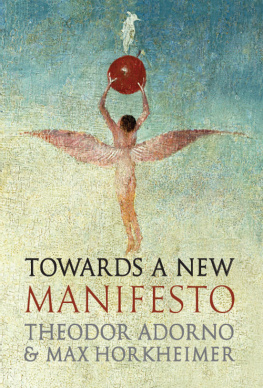a world
to win
a world
to win
Essays on THE COMMUNIST MANIFESTO
Edited by PRAKASH KARAT
Print edition first published in 1999
E-book published in 2017
LeftWord Books
2254/2A Shadi Khampur
New Ranjit Nagar
New Delhi 110008
INDIA
LeftWord Books is the publishing division of
Naya Rasta Publishers Pvt. Ltd.
leftword.com
ISBN 978-93-80118-49-9 (e-book)
Individual essays respective authors, 1999
This collection LeftWord Books, 1999
For
E.M.S. NAMBOODIRIPAD
Contents
PRAKASH KARAT
AIJAZ AHMAD
IRFAN HABIB
PRABHAT PATNAIK
KARL MARX AND FREDERICK ENGELS
FREDERICK ENGELS
The text of
The Communist Manifesto that has been reprinted in this volume was translated by Samuel Moore in 1888 and edited by Engels, and is taken from the Collected Works of Marx and Engels , Moscow 1976, volume 6. The text of the Preface to the English Edition of 1888 was also translated by Moore and revised by Engels, and has been reprinted from the Collected Works of Marx and Engels , Moscow 1976, volume 26. The asterisked notes [*] in both the texts are by Engels, and are identified as such. The numbered notes are by the editors of the Collected Works .
Prakash Karat
I
This book on The Communist Manifesto comes at the conclusion of the year marking its one hundred and fiftieth anniversary. The worldwide observance of the anniversary from February 1998 became an occasion for reappraising the historic significance of this remarkable document; for critically examining the contemporary state of Marxist theory; and for exploring new directions for the working class movement as we approach the twenty-first century.
The Manifesto was the first programmatic statement of the Communist movement. In the evolution of the thought of Marx and Engels, it was an exposition of the theory of historical materialism in a developed form. Lenin summed up its significance:
With the clarity and brilliance of genius, this work outlines a new world-conception, consistent materialism, which also embraces the realm of social life; dialectics, as the most comprehensive and profound doctrine of development; the theory of the class struggle and of the world-historic revolutionary role of the proletariat the creator of a new, communist society.
The Manifesto is a revolutionary charter for the anti-capitalist revolution: it equips the working class and other oppressed sections of society with the alternative vision of a socialist and Communist society. Unlike the earlier programmes of utopian and petty-bourgeois socialism, the Manifesto sets out the path to overthrow capitalism and realize socialism based on the actual conditions of society and historical development. The Manifesto places the working class in the central role, as the only revolutionary class which can act as the grave diggers of the bourgeoisie. It declares that the proletariat can no longer emancipate itself without freeing the whole of society from exploitation.
The enduring vitality of the Manifesto is due to the power of scientific theory combined with the fundamental of strategy for a revolutionary movement. Complex theory has been expressed in a lucid and compressed manner making it intelligible to the ordinary worker. The Manifesto remains the most powerful piece of writing produced by the Communist movement.
The Manifesto belongs to that historical period which began with the French workers revolt in February. Two decades after this abortive revolution, the working people of Paris set up the Paris Commune in 1871 for a short period of time. Between these two historical landmarks of the working class movement, Marx and Engels gave the theory of scientific socialism a finished form. Capital (Volume 1) appeared in 1867 marking the mature analysis of capitalism. The period saw the setting up of the International Association of Working Men in 1864 and the rapid development of the ideas of Marx and Engels on organizing the proletariat as a class conscious force. It also saw their increasing attention to the colonies, including India, which barely find reference in the Manifesto .
After the defeat of the Paris Commune, Marx and Engels looked towards Russia for the next revolutionary wave. In their joint preface to the Russian edition of the Manifesto in 1882, they point to a Russian revolution as the signal for the proletarian revolution in the West.
The elaboration of the concept of imperialism by Lenin represented a major advance in the theory of the development of capitalism. It is what Prabhat Patnaik, in his essay in this book, calls the second peak of unified theory which set the stage for the 1917 Russian revolution. The message of the Manifesto truly became a worldwide one riding the currents unleashed by the epoch-making event in Russia.
When the hundredth anniversary of the Manifesto was observed in 1948, the world was a different place. After heroic sacrifices, the Soviet Union had been instrumental in the defeat of fascism; the world was poised to witness the success of the Chinese revolution and the advance of the Vietnamese and Korean revolutions. The setting up of peoples democracies in Eastern Europe and the wave of national liberation movements were all part of the historic changes in the post-Second World War era. The end of the socialist experiment in the Soviet Union marked the close of this epoch. By the end of the eighties, the entire course of progressive developments came to be halted with the onset of a world-wide reaction. Marxism was faced with the greatest challenge to its existence and viability both in the theoretical and practicalpolitical plane.
The seven years since the fall of the Soviet Union have witnessed sustained propaganda by imperialist circles and their ideologues about the death of socialism and the obsoleteness of Marxism. This ideological blitz has been accompanied by the most determined drive of international finance capital to reinforce its sway and to penetrate every area in the world. What is termed globalization has constituted the most serious attack on the working people of both the developed and developing capitalist countries. The twin impact of these adverse events has seen the culmination of the process whereby some Communist parties have wilted and given up Marxism as a guiding theory.
At such a juncture, the one hundred and fiftieth anniversary of the Manifesto could well have been, at best, the commemoration of a historical document which has little contemporary value, or an occasion for a post-mortem of what went wrong with the seminal text on scientific socialism. Instead, the focus has been on the vulnerabilities of world capitalism and the striking relevance of Marxs analysis of the globalized capitalist system. 1998 saw the spreading crisis which began with South-East Asias financial collapse; it soon extended to the East Asian region with South Korea stricken, and Japan, the second most powerful economy in the world, being plunged into financial difficulties and recession. The economic collapse of Russia and the instability in Brazil followed suit.
The mood of triumphalism evaporated in the face of this gloomy picture. Doubts and recriminations surfaced among the most ardent advocates of globalization about the policies being pursued by the IMF. The policy backlash is the most serious challenge yet to the free-market orthodoxy that the globe has embraced since the end of the Cold War stated the Wall Street Journal . Conversely, working class struggles were imbued with a new vigour from the mid-nineties. After the prolonged assault in the trade union movement in the advanced capitalist countries, the French workers strike of 1995 marked a turning point for the steadily gathering current of working class resistance.


